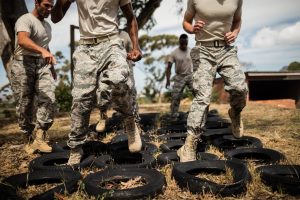
Military Training Programs and Homeschooling
November 16, 2022For high school homeschoolers contemplating a military career, there are options available to aid in preparing for a military lifestyle. The following programs are available: Junior Reserve Officer Training Corps (JROTC), Naval Sea Cadets, Civil Air Patrol, and Young Marines. Very few of the programs available to public/private schooled students have a homeschool counterpart, but some allow homeschool students to participate.
Junior Reserve Officer Training Corp
JROTC is a federally funded program that spans across all five branches of the armed forces, with most groups being Army JROTC groups. It is not a program meant to recruit high school students into the military, nor is it necessary for students to have a desire to join the military following their high school education. The main goal is to prepare students to become community leaders and productive citizens. JROTC is open to male and female high school students. As with most groups that are military-affiliated, JROTC is structured and organized. Various activities are offered to build confidence, acquire leadership skills, and learn teamwork.
In some locations, a student can join a JROTC program as a homeschooler. Currently, there is only one dedicated Homeschool JROTC group in the nation and it is located in Georgia. If students are interested in a local JROTC program, they should get in touch with the local group’s point of contact; that could be the school itself or the instructor. Some schools see JROTC as an extra-curricular activity, making homeschooler participation more likely. Other schools view JROTC as an accredited course of study. Those schools may allow homeschool participation, though several of them do not.
there is only one dedicated Homeschool JROTC group in the nation and it is located in Georgia. If students are interested in a local JROTC program, they should get in touch with the local group’s point of contact; that could be the school itself or the instructor. Some schools see JROTC as an extra-curricular activity, making homeschooler participation more likely. Other schools view JROTC as an accredited course of study. Those schools may allow homeschool participation, though several of them do not.
Naval Sea Cadets
Naval Sea Cadets is a program for students ages 13-17, with a junior group starting at age 11. Much like JROTC, students will find the Sea Cadet program to be a great course in leadership and teamwork. Unlike JROTC, however, is that Sea Cadets offer a scaled-down version of the Navy’s basic training to introduce students to military drill and discipline, physical fitness, seamanship, shipboard safety, first aid, naval history, and leadership. Additionally, twice-monthly drills (weekend training) are common among most Sea Cadet locations. Students interested in the Navy, Marine Corp., Coast Guard, and/or Merchant Marines will find many interesting activities in the Naval Sea Cadets.
Because Sea Cadets is not held during the school day or an after-school program, homeschool students should be able to participate in any location. However, students will likely be asked to submit evidence of good school grades and attendance. Contact your local Naval Sea Cadets group to inquire about participation.
Civil Air Patrol
Another option for homeschoolers is the Civil Air Patrol (CAP). Like the Sea Cadets, CAP is very accepting of homeschool students. Meetings are usually during the week and/or Saturday. A lot of the same benefits of the previous programs mentioned are true of the Civil Air Patrol as well. Students especially interested in the Air Force or aviation may particularly enjoy participating in CAP activities. While being involved in CAP, students could have the opportunity to compete for scholarships to be used toward earning a pilot’s license. Just like JROTC and Naval Sea Cadets, students involved in the Civil Air Patrol will have many opportunities to gain leadership experience and learn valuable teamwork skills.
Young Marines
The group allowing the youngest members is the Young Marines. Youths ages 8 through high school can participate in the Young Marines with the main requirement being that students are in good standing at school. Weekly meetings and regular activities make up the Young Marines program. Because the groups meet after school hours, homeschooled students should have no problem getting involved with Young Marines. As with the previous groups, leadership and teamwork are priorities in the Young Marines, but there isn’t a shortage of exciting activities either. Students would likely learn survival techniques, physical training, hiking, swimming, rock climbing, rappelling, and scuba diving, depending on the location of the unit.
All of the aforementioned programs do have some similarities. Regardless of the fact that they are military programs for youth, students are under NO obligation to join the military, nor must they even plan to do so upon graduating. However, participating in these various groups will likely earn students an advantage should they decide to join. College scholarships and/or enlisting at a higher rank are common to those who have excelled in their unit. These programs are also low or no cost to join. Uniforms are typically provided. Each unit varies, though, on cost and uniforms so ask those questions when inquiring. In each group, students work hard to earn their rank; the higher the rank, the more responsibility.
If a student is interested in participating in any of the above groups, a phone call to the potential unit would yield more specific information. Many useful skills could be acquired from participation in any of the military-based units listed. Leadership, community involvement, physical fitness, and teamwork are attributes that will benefit far beyond the high school years. Besides, learning to fly a plane, conducting survival training, or attending a military camp sound pretty awesome!
This post was written by guest author, Nicole McGhee.
Additional Homeschool Resources
How to Enter the Military as a Homeschooler
Preparing Teens for Independence
Find out more about homeschooling high school!
Latest Posts

Can you believe it's already September, and actually fall? Of course, for some of us, it still feels like the middle of summer. But we're longing for the cool crisp mornings, falling leaves,…
Read more >
Guest post by Heidi Rosenberg Education is the best legacy that parents can pass on to their children. However, the value of this legacy depends on the kind of education parents can afford…
Read more >
Post Sponsored by KaiPod Learning As a homeschooling parent, you've taken bold steps to provide your child with a unique, tailored education. You are part of a pioneering group of educators…
Read more >

